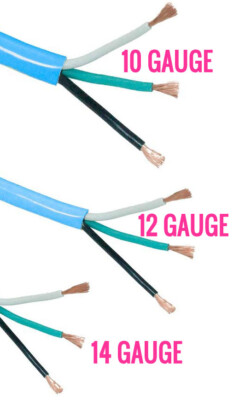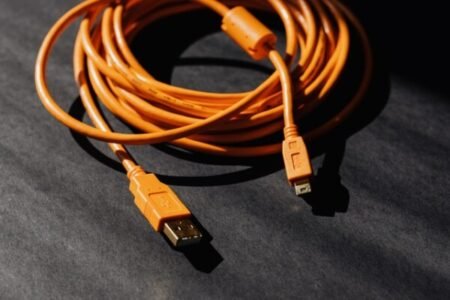Can You Leave Extension Cords Outside Indefinitely?
You have a job to do, and you need power outside. Maybe you’re keeping a battery charged in a detached garage or setting up for a weekend project.
You grab an outdoor extension cord, and the thought crosses your mind: “Can I just leave this plugged in all winter?”
The short answer is that you should only use an outdoor extension cord for as long as you need it. When you’re done, it’s best to unplug it and bring it inside to a dry, protected space like your garage or a shed.
While an outdoor extension cord is built to be tough, it won’t last forever against snow, ice, rain, and the sun’s powerful UV light. The elements will eventually break down the cord’s protective outer layer, creating a serious hazard.
According to the Electrical Safety Foundation International (ESFI), misusing an extension cord is a major fire risk. It contributes to thousands of home fires and injuries each year.
A cord can become a fire hazard if it’s overloaded, damaged, or too thin for the tool you’re using. Leaving it constantly exposed to the weather makes all these problems more likely.
What Really Happens When You Leave Cords Outside?
Leaving an extension cord outside exposes it to a whole host of problems that shorten its life and make it unsafe. Adopting a “set it and forget it” mindset is a recipe for trouble.
Sunlight is a major enemy. The sun’s UV rays relentlessly attack the cord’s plastic or rubber jacket, making it brittle and prone to cracking over time. These cracks can expose the live wires inside.
Moisture is another constant threat. Rain, snow, and melting ice can get into the plug ends, causing short circuits, rust, and shock hazards.
Animals, like squirrels and mice, have been known to chew on the soft covering of cords, creating immediate and often hidden dangers.
Physical damage is also a big concern. Simply driving over a cord with your car or lawnmower, even once, can cause unseen internal breaks in the wires. This damage can lead to overheating and a fire the next time you plug it in.
Storing your cord properly in a dry place is the single best thing you can do to ensure it has a long, safe, and useful life in your garage toolkit.
What’s the Difference Between Indoor and Outdoor Cords?

It’s tempting to think all extension cords are the same, but using the wrong one for the job is a serious safety risk. The key difference is in how they’re built.
Outdoor extension cords have a much thicker and more durable insulated jacket. This jacket is specially designed to resist moisture, UV rays, temperature changes, and general wear and tear.
Inside that tough jacket, outdoor cords have thicker copper wires than their indoor cousins. This allows them to safely carry more electricity over longer distances without getting too hot.
The rubbery or plastic coating is the cord’s first line of defense. As the ESFI warns, you must never use a cord with a broken or frayed jacket. Doing so puts you at direct risk of electric shock and fire.
How to Identify a True Outdoor-Rated Extension Cord
Thankfully, picking out an outdoor-rated cord is simple if you know what to look for. Safety standards require a clear marking for users.
Look for the letter “W” printed or stamped on the cord’s outer jacket. This “W” means the cord has been designed and tested specifically for outdoor use.
If a cord does not have a “W” on its jacket, it is for indoor use only. You should never use it outside, not even for a minute in perfect weather.
Using an indoor cord outside, even for a short time, can cause its thin insulation to break down quickly, creating a severe shock or fire hazard. Always choose the right tool for the job.
The Unsung Hero of Outdoor Power: The GFCI Outlet
When you use a “W” rated cord outside, you must plug it into a GFCI outlet. GFCI stands for Ground Fault Circuit Interrupter, and it’s a critical, life-saving device.
Modern building codes require GFCI outlets in all areas where electricity and water might meet, including garages, basements, kitchens, and all outdoor outlets.
A GFCI constantly monitors the flow of electricity. According to OSHA, if it detects even a tiny change—meaning electricity is leaking out—it shuts off the power in a fraction of a second.
This rapid shutdown is fast enough to prevent a serious electric shock. If your cord gets wet or damaged, the GFCI is your last and best line of defense against a potentially fatal accident.
When Should I Use an Outdoor Extension Cord?
The rule is simple and absolute: any time you need to run power outside the walls of your home, you must use an outdoor-rated “W” extension cord.
Even if you’re just working in the garage with the main door open, using an outdoor cord is the safest choice. It’s too easy for an indoor cord to be accidentally dragged outside into a puddle or left out in the rain.
Always use a proper outdoor extension cord for common garage and yard tasks. This includes powering holiday lights, operating electric mowers and leaf blowers, or running temporary work lights.
It’s also the correct choice for charging batteries for your cordless tools in the garage or a shed. For any permanent outdoor power needs, like for security cameras or landscape lighting, you must hire a licensed electrician to install a permanent, hard-wired solution.
How to Spot a Dangerous Extension Cord
Even the toughest outdoor cord can become dangerous if it’s damaged. Before every single use, give it a quick but thorough safety inspection.
First, run your hands along the entire length of the cord. Feel for any cracks, cuts, or brittle spots in the outer jacket. If you find any damage, or if you can see the wires inside, the cord is no longer safe and you must get rid of it.
Next, look at the plug and receptacle ends. Check for bent prongs and look for any black or melted spots, which are signs of overheating.
Make sure the plug fits snugly into the wall outlet. A loose connection can spark and overheat, creating a major fire risk.
When you lay out your cord, always place it where it won’t be a tripping hazard. Whenever you can, run it along a wall or structure to keep it out of walkways.
Water and Electricity: A Potentially Lethal Combination
Let’s be clear: outdoor extension cords are water-resistant, not waterproof. There is a huge difference between the two when it comes to your safety.
This resistance helps them handle morning dew or a light rain, but they are not designed to be submerged in puddles or hit with heavy, driving rain.
Before every use, check the plug and outlet ends for any moisture or dirt. If you find any, you must dry it completely before plugging it in.
For an extra layer of protection, especially when using a cord for a while in damp conditions, consider putting dielectric grease inside the female receptacle end. This non-conductive grease helps seal out moisture and stop corrosion.
Always assume there is extreme danger when using electricity anywhere near water. Even a small amount of water can create a path for a lethal electric shock.
If your work involves running power near a pool or pond, stop and call a licensed electrician. They can advise you on the specific and often strict rules for these high-risk areas.
Why You Shouldn’t Connect Multiple Cords Together
It can be tempting to connect two or more shorter cords to get the length you need. This is often called “daisy-chaining,” and safety experts strongly advise against it.
Every connection point between two cords is a potential weak spot. It’s a place where water can get in, the connection can loosen, and heat can build up.
The best and safest option is to always buy a single extension cord that is the correct length and thickness for your job. This removes unnecessary risks.
If you have absolutely no other choice and must briefly connect two cords, you must protect the connection point. Use a purpose-built, weather-resistant cover to shield the connection from moisture and physical strain.
Think of this as a temporary, last-resort solution. Your goal should always be to use one single, properly-rated cord for the task at hand.
How Do I Choose the Right Cord Thickness (Gauge)?

The “gauge” of a cord tells you how thick its internal copper wires are. This is critical because it determines how much power the cord can safely handle.
It sounds a little strange, but the wire gauge numbering system works in reverse. A lower gauge number means a thicker, more powerful wire, while a higher gauge number means a thinner, less powerful wire.
For light-duty tasks like running a small fan or a work light, a 16-gauge cord is often enough.
For heavy-duty power tools in your garage, like a table saw, air compressor, or a powerful garage vacuum, you need a stronger cord. A 12-gauge cord is the standard for these high-power tools.
Using a cord that’s too thin (a high gauge number) for a powerful tool can cause the cord to overheat, melt, and possibly start a fire. Always match the cord’s gauge to the power needs of your tool.
How to Find the Best Outdoor Extension Cord
Now that you know what to look for, you can choose the right cord with confidence. A high-quality extension cord is an investment in both your safety and your ability to get work done right.
Match the gauge and length to your typical needs. For general, heavy-duty garage and yard work, a 50-foot, 12-gauge cord is an excellent and versatile choice.
When you’re ready to buy, you can check out independent review sources for guidance. Reputable publications like Wirecutter, Bob Vila, and Consumer Reports offer expert testing and reviews.
You can also see our top recommendation, which we’ve chosen based on durability, safety features, and value for the dedicated garage owner, right here: The Best Outdoor Extension Cord.
A Final Word on Your Safety
Your garage is a place of pride and productivity, but electricity demands your full respect. The information here is designed to guide you toward safer work habits based on research and expert advice.
However, nothing can replace the guidance of a professional. I am a homeowner and a researcher, not a licensed electrician.
For any specific questions, permanent installations, or concerns about your home’s electrical system, you must consult a qualified electrician. They are the only ones who can provide definite solutions for your unique situation.
Treat every cord as if it’s live, check your gear before each use, and never cut corners on safety. By following these rules, you can power your projects and keep your workspace safe for years to come.









